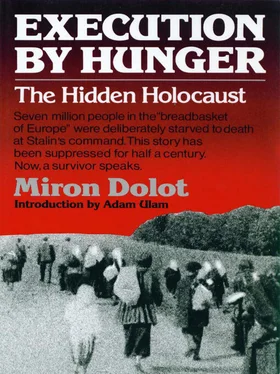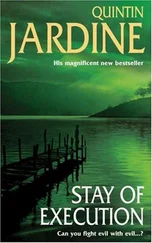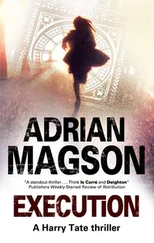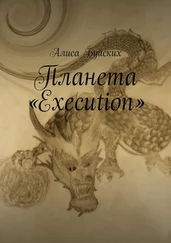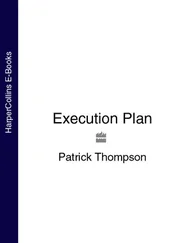This was terrifying news. The officials had enlisted Mother’s aid in the trial of her own son. As a witness, she would have to tell the story of the struggle between Serhiy and Comrade Khizhniak. We knew the true reason for the struggle would be ignored during the trial, since any resistance to Communist officials was considered an act of treason, even if it was an act of self-defense.
The following Sunday, we left the house to start for what had been until recently a church. It was snowing and bitterly cold.
The theater was already crowded to capacity, and the court was in session. A vykonavets was waiting for Mother. She could not stay inside while the court was in session, he told her, shoving her back to the door. As a witness for the court, she had to wait elsewhere until she was called. I wanted to stay with her, but she had to stay alone.
As I stayed inside, what struck me first was the silence. Indeed, it was still like being in church. The people sat solemnly, looking straight ahead without any emotion. All heads were bared as they always had been during church services in the past.
The next thing that attracted my attention was the extensive interior decoration, if this is the correct description. A kerosene lamp glimmered in the center of the ceiling where once had hung a crystal chandelier. On walls, once adorned with icons and religious art, portraits of Party and government leaders now hung. Above the former altar, in place of the painting of the Last Supper, hung a huge red-inked placard: “RELIGION IS THE OPIATE OF THE MASSES.” The sanctuary had been transformed into a sort of stage and the platform was liberally decorated with red cloth.
I had never watched a trial before. In fact, we had never had one in our village. We knew that there was a so-called People’s Court with its seat in the county center, but we never had close contact with it. Our village community had managed to solve its own problems without enlisting the help of outsiders.
It was midnight when my brother’s case was announced. Two militiamen brought him into the theater. He had changed dramatically in those few days. He looked dirty and exhausted, and all could see that he had been beaten. He had black eyes and on his lips and over his face traces of blood were visible. His hands were tied behind his back. Walking toward the bench reserved for the defendants, Serhiy looked around, probably searching for Mother and me. Then he was ordered to take his place.
The kolhosp court, according to the official line, was the supreme expression of the people’s will and justice. We saw the Party representative, Thousander Zeitlin, commanding the court ruthlessly, as if he were a judge. When my brother’s case was announced, Comrade Zeitlin rose to speak first. The strangers who were supposed to have been the kolhosp court kept silent. Always in the past, Comrade Zeitlin’s talk was utterly divorced from reality, and, specifically, from the matter at hand. We braced ourselves for a long speech. But, to our surprise he quickly announced the nature of Serhiy’s offense. As we expected, Serhiy was accused of physical assault on Comrade Knizhniak, the chairman of our Hundred. But we learned from Comrade Zeitlin that he was also accused of assault on the militiamen. His “crime” had multiplied since we saw him last. These were, we knew, serious accusations, for attached to them was Comrade Zeitlin’s statement that the assaults on the officials “took place while the latter were performing their official duties.” The circumstances surrounding these events were not mentioned.
Having pronounced the indictment, Comrade Zeitlin immediately started the interrogation.
“What right did you have to prevent the action of the Party and government representative?” was his first question to my brother. Serhiy tried to explain that he had not assaulted anyone; he had only grasped the arm of Comrade Khizhniak to prevent the shooting of his mother, a natural instinct, and a moral duty of a son. But this made no impression on either Comrade Zeitlin or the strangers.
“Don’t pull the wool over my eyes,” Comrade Zeitlin sneered. “Now, give an answer, yes or no: did you grasp the arm of Comrade Khizhniak?”
“Yes and no; it depends on how you look at it,” said Serhiy.
“Yes or no?” persisted Comrade Zeitlin.
“No,” answered Serhiy. He once again related what had taken place in our home.
But the interrogator was concerned only with the fact that officials had been physically deterred from doing their duty. The interrogation continued, and as it progressed, we heard Serhiy reluctantly repeating “Yes.”
During the interrogation, we learned the cause of the black eyes of Serhiy and his alleged assault on the militiaman. My brother had happened to have a pocketwatch with him in the village jail. It had belonged to our late father, and Serhiy treasured it most dearly. This pocketwatch had attracted the attention of one of the militiamen who was on duty in the jail. He offered favorable treatment to Serhiy in exchange for the watch. My brother said no. Next, the militiaman offered him food. Serhiy again refused. Then he was called out of his cell in the night and ordered to give up the watch. When he refused, a fight started between him and the militiaman. Both were thoroughly bruised before the colleagues of the latter helped subdue Serhiy. The blackened eyes and swollen nose were damning evidence in court. No one mentioned the whereabouts of the watch.
Comrade Zeitlin now addressed the militiaman who had been guarding Serhiy. “Comrade Militiaman, turn around and face the audience!”
The man did so, and the audience noticed the bruises below his eyes. Comrade Zeitlin then stood up and addressed the court:
“What you see now on the face of Comrade Militiaman is the second assault on a Party and government official, also perpetrated while the assaulted was performing his official duty. The assailant is here, before the People’s Court, comrades. I assure you, comrades, this enemy of the people won’t escape the people’s justice.”
This was all he said, but we understood that my brother’s fate was sealed. Serhiy knew that too, and he was visibly nervous. He looked frantically around as if trying to find some sort of help.
Next came the witness to the first alleged assault. This was something new, for in all previous cases there had been no witnesses. Comrade Khizhniak was called first. He too, had to answer just “Yes” or “No.”
“Did the accused struggle with you, Comrade Khizhniak?”
“Yes.”
“Did the accused grasp your arm as you were performing your official duty?”
“Yes.”
“Did the accused know that you were an official representative of the Party and government?”
“Yes.”
“Did the accused obey your order when you ordered him to leave you alone?”
“No.”
“Did you feel physical pain inflicted by the accused?”
There were many other questions put to Comrade Khizhniak. All of them were answered by “Yes” or “No.”
Comrade Khizhniak was followed as a witness by the woman who had been present that night as a member of the commission.
“Did the accused struggle with your chairman, Comrade Khizhniak?”
“Yes.”
“Did the accused know that your chairman and all the members of the commission, yourself included, were the official representatives of the Party and government?”
“Yes.”
The militiaman was then called on the second account. He was ordered by Comrade Zeitlin to face the audience.
“Who inflicted those injuries on you?” was the first question.
“The defendant.”
“Did the accused cause you physical pain?”
“Yes.”
“Did he know you were a government official?”
Читать дальше
